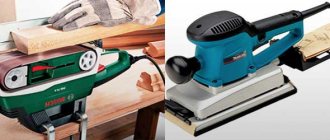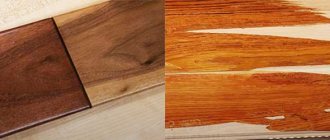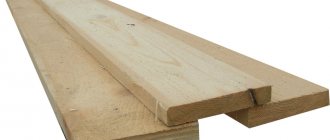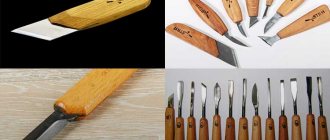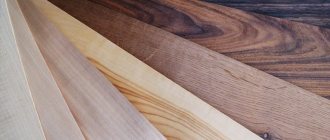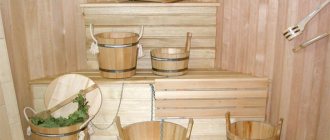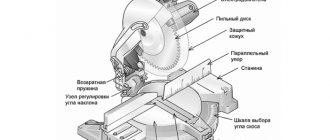0
10520
31.03.2014
A wood sander is an indispensable tool when performing finishing work in a country house. Using a sanding machine allows you to speed up the process of sanding and polishing wooden surfaces - wall cladding, floors, furniture, decorative elements. Wood sanders are convenient and compact, allowing you to perform high-quality leveling of any wooden surface.
Wood sander
There are several main types of sanders for household use; their different designs and operating principles determine their purpose. For construction and repair, carpentry and carpentry work, the following types of grinding machines are used:
- Belt sanders (LSM) are tools for aggressive and rough processing of wooden, plastic, and metal surfaces.
- Vibratory grinders (VSM) allow for softer processing due to circular movements with small amplitude. The grinding surface of the orbital sander has a rectangular shape, which makes it easier to process corners.
- A type of flat vibratory sander is a delta sander; it is distinguished by a triangular shape of the sole. The delta sander is convenient for processing small and hard-to-reach areas, corners, recesses and recesses.
- An eccentric sander refers to a tool that allows you to grind a surface to a polished state due to a combination of rotational and oscillatory movements of the sanding pad. But an eccentric sander is not suitable for processing small surfaces and internal corners.
Types of grinding machines
Factors to consider
If you need to process a wooden surface, then you need to choose the optimal device to do it correctly; you should take into account several important criteria:
| Type of product being processed | It can be anything: load-bearing elements made of timber or logs, finishing made of lining, block house or boards, window and door blocks, furniture elements, decorative items and much more. Naturally, each type of product has its own optimal tool option, with which you can achieve the best quality of work with the least amount of time and effort. |
| Sanding quality | Another important factor, because in some situations it is necessary to smooth out large irregularities, and in others it is necessary to bring the surface to an ideal state. Therefore, before sanding wood, you need to stock up on the necessary consumables - discs or brushes with different grain sizes. |
| Scope of work | Smaller projects can be handled by hand, while larger projects will require the use of power tools, otherwise they can take weeks or even months to complete. If you decide to sand the wood yourself, the easiest way is to rent the necessary equipment; the price of this service is low. |
For large volumes of work, you will need a sanding cup for wood - its service life exceeds all other options tens of times
Working with a manual wood router: features and lessons
Those who love carpentry, i.e. woodworking, should definitely know how to use a hand router. With the help of such a device, you can create true masterpieces without any effort at all. But for this, ability to work and knowledge of what this tool consists of, how to assemble and disassemble it will be useful. Using a hand-held wood router you can make a beautiful door, decorative furniture or other unique items. You can even open your own business making various wooden products.
How to do the job correctly with a hand router
A huge number of electronic devices for construction and repair carry out their work by rotating the shaft. A hand router makes a huge number of revolutions per second. It is generally accepted that woodworking will be done cleaner by a router if there are as many revolutions as possible. This is essentially a false worldview. The object may become charred and break if the speed controller is installed incorrectly and when work is performed with a cutter of huge diameter.
That is why for each type of work and material it is necessary to select and set a certain number of revolutions per second. The work will be carried out even cleaner if the ratio of the speed of movement of the cutter relative to the wood species being cut is correctly selected.
Work with a manual router is carried out by placing it on a special table or simply holding it in your hands. Small workpieces are usually milled on a stationary table. This facilitates the completion of work without any defects. The router is installed on such a table with the spindle pointing upward.
In order for milling on the table to be performed without errors, you need to:
- Place rulers on the surface of the table, according to the shape that will need to be cut;
- Narrow rulers with a rounded end are needed for working with parts of variable profiles and they are attached to the table surface perpendicular to the workpiece.
It should be kept in mind that when working with a hand router, it should certainly be moved in the opposite direction relative to the movement of the cutter. Otherwise, the tool often breaks out of your hands and causes injury.
Random orbital sanders
Eccentric sanders
When processing a wooden surface, the sole of the eccentric sander moves in several directions: back and forth and around its axis. The quality of processing depends on the rotation speed and vibration amplitude. This type of equipment does an excellent job of grinding both smooth surfaces and curved parts. An eccentric sander can be used for fine sanding, polishing and cleaning of wooden parts.
You can use eccentric sanders at home and in professional activities, it all depends on the amplitude of the equipment’s vibrations, the power and the number of revolutions of the grinding surface. The most powerful machines: the vibration amplitude of the processing sole is not less than 7 mm and the power is 750 W, suitable for rough processing and characterized by high productivity.
Eccentric (or orbital) sanders, due to their circular motion path, allow you to achieve a perfectly flat and smooth surface.
Based on the method of attaching sanding sheets, machines are divided into two types: clamping and Velcro models. Machines equipped with a clip are slightly less expensive than similar models with Velcro. This is due to the fact that consumables for this type of equipment are easier to select and cost less. But changing the sanding sheet takes a little longer and is technically more difficult. Machines equipped with Velcro are much easier to use, but consumables are more expensive due to specific fasteners.
Professional and some household models of eccentric sanders are equipped with additional devices for dust removal: vacuum cleaners with dust collectors and a filtration system. Thanks to this, working with equipment becomes safer, since fine dispersed dust is very dangerous for the respiratory system.
Purpose and scope
Despite such a wide variety, they all perform almost the same functions:
- preparing the surface for further processing (removing old paintwork, removing natural blue and darkening);
- rough processing;
- grinding;
- polishing;
This tool is widely used both in solving production problems and in the home workshop. Certain types of angle grinders are capable of brushing wood. Depending on the quality of processing, an abrasive tool is selected.
Making a grinder from a grinder
Many may say that the “grinder” is the same as an angle grinder, but there are some subtleties hidden here. It should be borne in mind that the angle grinder has very high speeds and often quite a decent weight. To polish a surface with a grinder, you need to have considerable experience in this matter and use special polishing discs and circles. The grinder has much lower engine speed and weight. To operate a factory grinding machine, no specific experience or skill is required.
You can independently make a good grinder from an angle grinder, which is not inferior in its parameters to a factory machine, only by modifying its electrical circuit, by installing the regulator at lower speeds and by using special grinding attachments.
What is a sander?
For the convenience of processing internal and external surfaces of wood, plastic, metal or stone, a special grinding machine is used. This power tool is designed to make the product smooth, that is, to reduce the roughness coefficient of its surface. The device is actively used in the process of car body repair, construction work, wall and floor repair, and furniture restoration. A grinding machine significantly speeds up manual labor and improves the quality of the work performed.
What is sandpaper
Sanding paper is a combined material that consists of:
- The basis of sandpaper is most often paper or fabric.
- Abrasive is a grain that is applied to a substrate using glue or resin.
Manufacturing
Sandpaper production was first started in China in the 13th century. Craftsmen glued river sand of various sizes, crushed shell rock, and plant seeds to parchment using agar-agar or starch glue. Later they came up with the idea of using crushed glass as an abrasive, hence the appearance of “glass paper.”
Serial production of sandpaper began in London in 1833, then began to spread throughout the world, technology improved, and today we see a variety of types of this product.
Production stages:
- The paper base or fabric is impregnated with polymers, most often rubber latex.
- Glue heated to 30...50C is applied to the prepared base.
- The abrasive of the required fraction is applied using the bulk method.
- The semi-finished product is sent to the oven for drying. The temperature depends on the type of glue, grain fraction and other factors.
In this way, you can make low-quality sandpaper at home using thick cardboard, crumbs from an abrasive wheel or crushed glass, sand.
Release form
Finished products are stored by stacking sheets or rolling them into rolls. Sheet fabrics have sufficient rigidity, so they are difficult to bend. Sandpaper in rolls is more compact to store, its fraction and grain size are smaller than that of sheet sandpaper.
Other release forms:
- The abrasive mesh is a sparse sheet with fixed grain. When sanding, even the smallest dust particles pass through the material and do not become clogged in the pores. This working method is called “dust-free sanding”.
- Abrasive wheels are fine-grained sandpaper cut to the shape of attachments for mechanical devices. Its purpose is to clean the metal surface from rust and remove old coating.
- Sandpaper of different grits, cut to the shape of the attachment for power tools with Velcro fastening or to the holes made.
- Sanding belts intended for threading into sanding machines and machines.
Marking
Sandpaper markings indicate the fraction and concentration of the abrasive. Domestic GOST 3647-80 determines the number of grains of different sizes per 1 square unit, but this classification is considered outdated. Today, sanding paper complies with international ISO standards; this designation can be found on the back of the product. It should be noted that the data of the old GOST and the values of international standards overlap with each other. Their correspondence can be seen in the table.
The main difference between the old and new standards is the different movement of numbers in the markings:
- In GOST 3647-80, the values of grain size and density are reduced, which is quite logical;
- In the new ISO 6344 standard (GOST 52318-2005), the product number increases with decreasing value in the marking.
Decoding grain size
The letter "P" in the designation indicates the grain size. The larger the value behind the letter, the finer the skin fraction. P400 is a known zero. P600...P2500 have small fractions and an almost smooth surface; their grain size is not so noticeable to the touch. This type of sandpaper is used for final polishing in industry.
In the old GOST, things were different. Using 10-N as an example: the first number means that an abrasive of a size corresponding to a sieve with a mesh of 100 microns is applied to the surface of the product. The lower the indicator, the smaller the screening size.
Other designations
Types of sandpaper differ in the composition of the base and the properties of the grains. This information is also reflected in the product labeling.
- The letter “L” indicates the sheet form of the product. Rolled is not indicated in any way.
- The letter "M" stands for waterproof sandpaper.
- The product marked “P” is intended for grinding dry products without contact with moisture.
- “1” is an abrasive for soft surfaces, “2” is for hard surfaces.
To select emery for a certain type of work, you should take into account not only the main classification, but also the information provided, which is contained on the back of the sheet.
What is sanding?
Grinding as a process does not evoke the most pleasant impressions for many, even when just mentioned. What can I say – this is a monotonous, painstaking, time-consuming, and slightly harmful operation, but it cannot be avoided. Modern requirements for finishing work have increased so much that no one questions that the surfaces must be perfectly smooth.
Manufacturers of finishing coatings try to make sure that only one layer is needed, which will smooth out all the imperfections of the base. Even sheets with a decorative coating need to be joined together, which entails filling with putty and, inevitably, sanding. Builders and finishers in our country are slowly but surely beginning to master all the newly introduced standards and techniques for achieving them.
Fortunately, progress is not lagging behind: such a useful and inexpensive tool as a grinding machine helps to cope with this task. The hated sandpaper for grouting, or the timber clutched in your hands, remains a thing of the past. Equipment manufacturers spoil us with a variety of tools that are designed for many types of repair work, and sometimes it is difficult to choose the tool that is right for you. So how to choose a grinder? It’s not difficult to deal with this issue; the main thing is to understand why this or that tool is needed, and to understand what exactly you want to get as a result.
What to look for when choosing
In addition to the type of grinder, it is necessary to take into account basic technical parameters:
- Electricity consumption: from 110 to 600 W. It's worth noting that more efficient machines tend to use more electricity. For home, a 300 W option is suitable.
- The number of revolutions the sole makes: 6-25 thousand. Most often, slow instruments have high amplitude. Such models are used for rough processing. For finishing sanding, it is better to choose an electrical appliance with a higher speed.
- Amplitude: 1.5-5 mm. Shows how much the sole moves relative to the material with each movement. If you need a device for rough work, you should choose a device with the maximum value, and for fine finishing 1.5 -2.5 mm is suitable.
Specifications
The quality of a tool's performance is determined by its parameters. Before figuring out how to operate an eccentric sander correctly, you need to study its technical characteristics.
| Parameter | Peculiarities |
| Power | Depends on the energy consumed and ranges from 220-450 W. The more powerful the device, the higher the performance |
| Rotational speed | In unregulated devices the fixed speed is 12 thousand rpm. In other models - ranging from 2000 to 20000 rpm |
| Oscillation amplitude | The indicator affects the quality of processing:
|
| Plate diameter | Running parameters – 125 and 150 mm. The more powerful the ESM, the larger the diameter of the circle. There are also non-standard sizes (50, 80, 115 mm). They are used for cleaning corners |
Important! The greater the amplitude, the worse the quality, but the higher the productivity.
Eccentric orbital sanders have to work not only on horizontal surfaces. That’s why another parameter is so important – the mass of the tool. The more powerful the machine, the heavier its engine, the more uncomfortable it is to operate the device in weight. The weight of household ESM is about 1.5-2 kg.
Best in the household series
Despite the shorter service life, the household series tool can process flat and curved surfaces. Perform rough and fine grinding of concrete, plaster, putty. Polish metal, plastic, glass, natural and artificial stone
KOLNER KRS 430 – the cheapest in its segment
The eccentric machine is used on wood, metal and plastic surfaces. Used for leveling plastered walls during home renovations. Polishes varnish and enamel coatings. Smooth speed control determines the required processing mode. Equipped with a dust removal system, which allows operations to be carried out indoors.
PROS
- Affordable price.
- Power.
- Low noise.
- Autonomous dust collector.
MINUSES
Does not perform fine polishing of the car body.
PATRIOT OS-125 – the lightest
The grinder will perform the stages of rough and fine processing of flat and curved surfaces. The low weight of the tool allows you to spend more time working without fatigue during the processing of a part. An effective dust extraction system concentrates waste into a removable dust container. The abrasive wheels are fixed with Velcro, which ensures a quick change of consumables.
PROS
- Lightweight - the hand does not get tired longer.
- Optimal power for home repairs.
- Effective cooling system - the electric motor does not overheat.
MINUSES
You have to hold the machine tighter - centrifugal forces tend to tear it out of your hands during the working process.
ENKOR MSHE-450/150E – the largest fluctuations
Works effectively during rough and medium grinding operations. Levels the plastered surface and smoothes the finishing putty. Removes old paintwork, rust, and scale from metal workpieces. The presence of an additional handle makes it easier to use.
PROS
- Increased diameter of the work plate.
- Long cord.
- Endurance.
MINUSES
- Ineffective dust collection system.
- The fixation of the sanding attachments fails quite quickly.
BOSCH PEX 300AE – the most productive
Tool for household use. Despite the classification, it allows dry sanding of wood, metal, and plastic. It is used for home repairs to remove old paint coatings, leveling plaster and putty. Dust emissions are mitigated by an effective microfiltration system.
PROS
- Allows you to perform a large amount of work.
- Doesn't get dusty.
- Equipped with an anti-vibration system.
MINUSES
- A bit noisy.
- Abrasive discs do not work evenly over the area.
ELITECH MSHE 0515E – the most powerful
The power of the electric motor is sufficient to perform operations such as grinding down convexities of plastered walls, smoothing the putty layer, and grinding the surface of ferrous and non-ferrous metals. Performs rough and finishing processing of wooden blanks. Connecting a vacuum cleaner allows you to keep your work area clean.
PROS
- Powerful electric motor.
- Work at a semi-professional level.
- Long cable.
MINUSES
An extra handle is missing.
The best wood sanders
A good sander can facilitate and speed up many jobs with wood and wood-based materials, metal and plastic surfaces. Those who do serious repairs or finishing entirely with their own hands should take a closer look at the models presented in our rating.
1
Bosch PBS 75 AE
Large grinding area
The “green” PBS series belt sander from Bosch is intended for household use, but its characteristics are very close to those of a professional tool.
Find out the price
- Power 750 W
- 200-350 m/min
- Tape 533x75 mm
A household tool with additional functionality could easily be classified as a professional tool. The design includes a soft start mechanism, electronic speed control, and an automatic centering device for the abrasive belt.
A reliable and powerful electric motor allows you to process large areas of wooden or metal surfaces. Optimal weight and good balance make this task easier. An additional handle is provided for convenient control of the powerful tool.
The similarity with professional models is added by the large complete case in which you can store the machine, equipment and even some small tools. The only complaint I have is the power cord - it is a bit harsh, but reliable.
2
Makita 9910
Perfectly balanced
The professional series tool with excellent balancing of all components is distinguished by good ergonomics of the body and handles.
Find out the price
- Power 650 W
- 270 m/min
- Tape 457x76 mm
The compact and fairly lightweight sander is suitable even for working with one hand - its design is so well thought out. The model is equipped with a large bag for collecting chips and dust. The “Start” button is installed on the main handle and is locked in the on position.
Makita has received a special mechanism for quickly changing the sanding belt. And the automatic centering system ensures the accuracy of the movement of the equipment, preventing it from sliding to the side during operation.
Speed adjustment is not provided in this model, but most craftsmen will not need it. But you will have to periodically replace the front roller, since it is not metal and wears out a lot over time.
3
Einhell TE-OS 2520 E
Vibratory sander with complete set
The Expert series vibration machine is distinguished by universal attachment of equipment. It can be secured with either clips or Velcro.
Find out the price
- Power 250 W
- 24,000 kol./min
- Amplitude 2 mm
The high power of the tool, coupled with the speed support, on the one hand, allows the machine to cope with difficult areas, and on the other hand, not to remove too much where precision is required. The size of the soleplate has been increased for efficient and fast sanding of large surfaces.
Thoughtful ergonomics and built-in vibration isolators allow you to work comfortably on weight for a long time without fatigue or discomfort in your hands. The model copes well with wood and metal, but it is not advisable to use it on puttied surfaces - it can become clogged with fine dust and refuse to work.
Sanding sheet, storage case and dust bag are already included. If long-term work is required, the machine can be connected directly to a construction vacuum cleaner.
4
Worx WX820
Multifunctional model
This battery-powered vibrator impresses with its functionality. Replaceable soles of different shapes and sizes allow you to work with almost any surface.
Find out the price
- Voltage 20 V
- 10,000 kol./min
- Weight 2 kg
A very unusual surface grinder can replace 5 similar tools. It comes complete with rectangular and triangular platforms, wide and narrow - for working with parts of any shape. There is a round plate for working in eccentric machine mode. Each attachment comes with 3 replacement skins.
The tool runs on a fairly powerful 20 V battery. Its characteristics are not redundant, since the battery also powers the built-in vacuum cleaner. The battery itself is protected against deep discharge. In addition to the battery and charger, the kit includes a case. But you can buy the “carcass” separately.
5
Bort BS-155
Budget machine for everything
This model has already become popular. Firstly, due to its low price with decent quality and characteristics, and secondly, due to its versatility of use.
Find out the price
- Power 150 W
- Equipment 90x240 mm
- 10,000 kol./min
BS-155 is one of the most reliable and high-quality vibration machines in the budget segment. It is suitable both for working with wooden surfaces and for sanding walls after finishing, felting, bodywork and other similar work. It’s nice that at such an unrealistically low price, the manufacturer provides a 5-year warranty on this model.
The tool turned out to be light with good performance and not too noisy. It does not have its own dust collector, but there is an adapter through which Bort connects to the vacuum cleaner.
The machine comes with one sanding sheet. The equipment is attached to the sole only with a clamp - no Velcro is provided.
6
Metabo SXE 150-5.0 BL
Disc sander with long platform stroke
This professional model has a somewhat non-standard layout with an elongated handle. But it turned out to be very ergonomic, light and obedient.
Find out the price
- Power 350 W
- 10,000 rpm
- Amplitude 5 mm
- Disc 150 mm
An expensive professional machine that fully justifies its price, it is built very well - there are no complaints about its quality. Inside there is a relatively quiet and reliable brushless motor, which contributes to the longevity of the tool.
The model has a large platform travel. Together with wide equipment, this will allow you to sand the wood faster, and at the same time eliminate intermediate leveling after roughing. Metabo will eliminate all flaws. If necessary, you can install a multi-hole sole with a diameter of 125 mm here.
The functionality of the machine matches its level. There is a smooth start and stepless speed control within the range of 4000-10000, a double braking system is provided (for the plate itself and the engine). The speed is stably maintained at the set level, regardless of load changes.
7
DeWalt DWE6423
The best random orbital sander
DeWalt grinders are generally loved by craftsmen, despite their high cost. The equipment is reliable, powerful, well made. And this model is chosen because of its smooth running and convenient dust collector.
Find out the price
- Power 280 W
- 12,000 rpm
- Amplitude 2.6 mm
- Disc 125 mm
The machine is designed for industrial use down to the last detail. It is quite light and well balanced. The non-slip plastic of the case lies securely in the hand, vibrations during operation are minimal (as far as possible for such a tool). Velcro holds the abrasive perfectly and does not lose its tenacity over time.
The model is equipped with a dust collector for clean work. It is powered by the network and has a soft and long 5-meter cable. Adjusting the speeds and stabilizing the speed under load allows you to carefully work with wood of any density and regardless of the pressure. For prolonged grinding, the power button lock will be convenient.
The only thing that has not been thought through here is the storage system for the machine and its components - DeWalt does not offer a case for this model.
8
Aspro-C8
"Giraffe" for walls and ceilings
An eccentric machine is designed for fine grinding of surfaces before finishing. The long handle allows you to process the ceiling and walls over the entire height (up to 3 m).
Find out the price
- Power 710 W
- 600-1500 rpm
- Disc 225 mm
The sander is equipped with a medium-hard pad and leaves behind a perfectly smooth surface suitable for painting. Smooth speed control will allow you to select the desired mode for any material: wooden frame, plaster, putty, drywall. In addition, the kit already includes 6 abrasive wheels with grits from 80 to 240. To work in corners and narrow niches, the casing can be removed.
The “giraffe” design is complemented by a long and very flexible corrugated hose (4 m) for removing dust. A special adapter at the end easily connects to the branch pipe of a construction vacuum cleaner. There is a valve on the body of the machine that regulates the suction force.
However, it should be borne in mind that an eccentric machine will inevitably produce vibration. Taking into account the arm of the telescopic handle and the fairly high power of the motor, it becomes quite noticeable.
9
Metabo FMS 200 Intec
Compact but powerful delta sander
The tool is distinguished by quite high power for such equipment. But this was achieved solely through a network connection.
Find out the price
- Power 200 W
- 26,000 kol./min
- Amplitude 1.4 mm
Metabo's Delta is one of the few compact sanders on the market that is corded. The cable here is moderately long (2.8 m) and thin, but still it can interfere with operation. However, the inconvenience is compensated by the good balance of the instrument and the almost complete absence of vibration transmission. This way you can work with one hand.
The machine is equipped with its own dust collector in a hard case with its own filter. Dust removal is fast and clean. The power button on the body is hidden under a plastic cap - not very convenient, but safe for both the master and the instrument itself.
10
Einhell TE-OS 18/1 Li
Battery delta
Working with a cordless delta sander is quite convenient, since nothing prevents you from turning it in corners and narrow areas.
Find out the price
- Voltage 18 V
- 24,000 kol./min
- Amplitude 1.6 mm
The machine, powered by an 18 V battery, offers a good power reserve and the ability to be used autonomously without being tied to sockets or an extension cord. However, the manufacturer has a similar network model (TE-OS 1320) - it is cheaper, but has an increased amplitude of 2 mm.
The cordless version of the Einhell delta is sold as a separate “carcass”, but is supplied with 6 sanding sheets of the required size. This will allow you to not worry about finding suitable consumables for some time, although you can find something better to replace them. The only thing the tool lacks is speed control.
11
Makita 9741
The best brush sander
The grinder for continuous work in the workshop performs rough and fine grinding, roughing and stripping operations on wood, metal, composites and plastic.
Find out the price
- Power 860 W
- 3500 rpm
- Brush width 120 mm
This is probably the only model on our market that works with wide brushes and is suitable for professional processing of very large surfaces. The included nylon brush brings out the natural grain of the wood.
To confidently hold the powerful tool during operation, two handles are provided. The longitudinal one is equipped with a lockable start button. The size of the removed layer is regulated by the preliminary setting of the grinding depth.
12
Sturm AG1014P
Classic brush machine
A powerful and reliable model is used for stripping, cleaning surfaces from efflorescence and rust, creating a decorative smooth or embossed structure on wood.
Find out the price
- Power 1400 W
- 3000 rpm
- Brush width 100-120 mm
A powerful and at the same time reliable machine comes with a full range of options: soft start, speed control, maintaining a constant speed during processing, locking the start button.
The equipment is changed simply and quickly, and you can use brushes from different manufacturers (including domestic ones). Efficient engine cooling is provided to protect against overheating. The machine itself is assembled conscientiously, despite the relatively low price.
Application of belt sanders
Belt sanders are used where it is necessary to quickly remove a fairly thick layer of material, for example, to sand an unplaned board or remove old paint from surfaces. LSMs are also used for precise fitting of parts and processing of the cut line.
The material is processed using an abrasive belt closed in a ring and stretched over rotating rollers. When moving, the tape removes a fairly thick layer of material, comparable to the work of an electric planer. The thickness of the removed layer depends on the grain of the abrasive belt.
When choosing a blade grinder, you need to pay attention to two parameters: the width and length of the abrasive belt used and its rotation speed. The area of the processed surface depends on the width, the aggressiveness and degree of processing depends on the speed.
The standard tape sizes for LSM are: 76x457 mm, 76x533 mm, 76x610 mm. The belt width of semi-professional sanders may be larger - 100 mm, but they are rarely used for household needs. The belt speed is usually in the range from 150 to 500 meters per minute, the power is from 400 to 1200 W. Useful functions include smooth control of the belt rotation speed and an automatic belt centering device, which prevents it from slipping off the rollers even during rotational movements.
Belt sander for wood
There are two types of abrasive belt for blades, with an abrasive layer of aluminum oxide or zirconium. Zirconium tape provides a deeper but more aggressive finish and promotes scratches that need to be treated with a less grainy tape. For processing metal surfaces, it is better to choose a zirconium tape; it can be used to sharpen cutting surfaces.
Surface processing using a belt sander is carried out as follows: place the machine on the surface to be processed without distortions, and, without putting pressure on the machine, make smooth longitudinal or circular movements along the surface of the material. If precise fitting of parts is necessary, grinding is carried out with short-term translational movements or using a bounding frame.
Application of orbital sanders
The operating principle of these tools is similar: grinding is carried out through light circular and oscillatory movements of the grinding surface with an amplitude of up to 5 mm. Sheets of sandpaper with different grain sizes are used as an abrasive material, secured to the sole using clamps or Velcro.
Orbital sander for wood
Vibratory sanders provide high quality processing and are used for grinding almost any materials: wood, plastic, metal, plaster and putty, as well as for removing corrosion products and old paint and varnish coatings.
The degree of processing depends on the amplitude of vibrations: for rough processing, an amplitude of 4-5 mm is chosen, for fine grinding - 1.5-3 mm. For household models, the rotation speed is usually adjusted in the range of 2000-5000 rpm, and the oscillation speed can be in the range of 25,000 per minute. The ability to regulate the eccentric amplitude, rotation speed and oscillations are very useful options for a VSM.
An important parameter is the power of the VSM; it is usually in the range of 150-600 W. The higher the power, the greater the productivity and continuous operation time of the tool. Another important factor determining the use of a VSM is the shape and area of the grinding pad. It can be square, rectangular or deltoid.
Kinds
Before choosing a wood sander, you need to familiarize yourself with the main types of devices.
Tape
It is recommended to buy such carpentry sanders for the first sanding of wooden surfaces. They are ideal for removing old layers of varnish or paint. Also, tape devices are often used to fit furniture parts.
Belt-type tools work on the principle of a plane. The circle-shaped tape rotates on special rollers. To start the sanding process, you need to press on it with a wooden product.
Orbital (palm)
When choosing a sander, you may encounter orbital devices. They can be divided into two main types.
Standard
Tape devices - most common models
It is recommended to buy such grinding machines for people who often have to work with uneven surfaces. Standard orbital models are suitable for processing sharp corners and flattened edges of wood.
These devices resemble tape devices. The only major difference is that grain paper is used instead of ribbons. Compared to belt sanders, orbital sanders are more versatile and multifunctional. Some consider them to be the best devices for sanding wood.
Random orbital
Another device that is often used for processing wooden products is random orbital CMMs. They differ from other models in the features of their work. Sanding is carried out using the installed sandpaper. It not only moves with the help of rollers, but also vibrates a little. Thanks to this, it is possible to clean even ribbed surfaces.
Detailed and multi-tooled
The best wood sanders include detail and multi-tool products. There are several varieties of such models.
File Sander
File Sander - universal polishing machine for polishing various materials
Quite often people hear the terms “finger sander” and “sander”, but do not know their exact meaning. These phrases are used to describe grinders that are equipped with a very narrow belt. With its help, it is possible to process even hard-to-reach places that cannot be reached using conventional CMM.
Such models are universal, as they can be used for sanding coatings made of:
- metal;
- wood;
- plastic;
- ceramics.
To process the above materials, you will have to use paper of different grain sizes.
Oscillating spindle
Oscillating spindles are often found in the ratings of grinding machines. This is a static tool that is equipped with a fairly long grinding drum.
Such CMM models are often used as tabletop tools. They are used for processing difficult angles, as well as curved surfaces. At the same time, the oscillating spindle is capable of sanding not only wood, but also metal.
Sander straight
Drum CMMs will help clean wood from glue, paint or varnish
Many people don't know which sander is best for smoothing straight edges. For such purposes, it is necessary to choose a straight sander. This tool will quickly smooth out all the edges and polish your plank floors or walls.
The main difference between this tool can be considered the features of its operation. During sanding, the sandpaper moves parallel to the grain. Thanks to this, it is possible to polish the edges of products much better. It also makes sanding ribbed surfaces easier.
Drum type sander
People are often interested in which sander is best for sanding wooden floors. A fairly popular tool that is regularly used in woodworking is the drum-type CMM. This device can be used to remove residual glue, paint or varnish. Also, with the help of such an angle grinder you can process surfaces made of plastic, metal and ceramics.
General recommendations for selection
The market is flooded with offers from little-known companies; in appearance, such models may not differ much from high-quality devices, but the difference will become noticeable only after some time. The price of such mechanisms may look attractive, but the savings will cost dearly in the future. So you need to know what to look for when choosing such mechanisms.
It is more convenient to give recommendations for choosing a specific model depending on its type, but you can also give some general advice.
In the store it is worth checking out:
- sander weight. It’s good if you don’t need to keep it suspended for a long time, in which case the weight of the machine can even be considered an advantage. But if you have to hold it in your hands, then preference should be given to a higher speed of movement of the working surface;
- its behavior when turned on. It is clear that a wood sander is not a quiet tool, but some models simply set a record, stunning their owners. Also, at idle, it is worth assessing the vibration; if the machine “hits” hard, then there is a high probability of its rapid failure;
- cost – it is quite possible to choose the optimal price/quality ratio without high expenses. The same Interskol produces a fairly reliable tool;
- the possibility of quick repairs also plays an important role, so exotics from this point of view are not the best choice; spare parts for not very common brands of mechanisms are difficult to find;
- The dimensions of the slab, mini-slab (about 100 mm2) are suitable only for processing small wooden products.
Slab dimensions can vary greatly
Some craftsmen make something like grinders on their own. But a homemade machine is not able to compete with professional ones in terms of surface quality. The maximum that such a handicraft mechanism can be used for is processing small wooden parts.
Main settings
Before choosing a tool, you need to understand its main characteristics.
- Power. The performance of the grinder depends on this parameter. The power of this tool ranges from 600 to 2500 W. The greater the power of the unit, the higher its quality indicators. They weigh more and cost an order of magnitude more. For simple woodworking, a grinding machine with a power rating of 600-800 W is suitable.
- Working surface area. This value affects the speed of work. The larger the working surface area, the faster it will be possible to grind the desired plane. Belt options have a smaller working surface, while vibrating ones have a larger one.
- Disc diameter. The diameter determines the area that can be processed at one time. This parameter also affects the finishing time.
- Additional equipment. Different models can be equipped with additional auxiliary elements.
- Additional handle. The handle helps to evenly distribute the load and reduce vibration. They are mostly two-position, less often three-position.
- Dust collector. Collects dust that is generated during operation of the mechanism. It can be either built into the unit itself or be a removable element on the side. There are replaceable and permanent options for dust collectors.
- Speed stabilizer. It can be used to control the rotation speed. The stabilizer allows optimal use of the grinding machine's performance.
- Speed controller. With its help, you can control and regulate the speed required for work.
- Case. A convenient way to store and transport tools.
- Battery. For autonomous use of the grinder, some models are equipped with a removable battery.
Choosing an electric milling machine
In order to mill at home, it is recommended to choose a universal tool, which is an electric router with an interchangeable base - plunge and edge, thanks to which it can do any type of woodwork, depending on the type of cutter chosen. It is better if it has speed control, to work with a cutter with a diameter of more than eight mm, the best power should be 800-1300 W. When choosing a tool, you should pay attention to the actual immersion depth of the cutter, on which the greatest depth of the resulting groove will depend.
The best option for clamping the cutter is a conical collet, and for the switch - a locking button. The smoother the operation of the rod mechanism, the more durable the tool.
An important point in the operation of an electric milling machine is the correct choice of a cutter, which consists of a cylindrical shank of various diameters (6.8 or twelve mm) and a part with a cutting edge.
READ Chainsaw Safety
According to their design, cutters are divided into the following types:
- One-piece
- Prefabricated
- With replaceable blades.
Depending on the type of processing performed by the cutter, it also comes in several varieties:
- A groove cutter is used to form grooves.
- Profile - to give the edge a decorative profile.
- Edge and seam cutters are used to process the edges of the product.
- Filling – for cutting a “U”-shaped notch on the product.
- The cone cutter bevels the edge of the product at an angle of 40 5 degrees.
- Moulded – forms a rounded edge.
Working with a hand router: decorative processing
For artistic milling, in addition to a cutter, a jigsaw, a vice, a chisel, and a piece of wood with a pattern will be useful. It is fixed on a perfectly stable surface, and an electric milling machine equipped with a special cutting attachment is carried out according to the design, evenly removing a layer of wood until the required volume of the ornament is achieved.
How to cut a coffee grinder?
On the Internet, this topic is so “hackneyed” that you can get confused in the advice of “masters” on how to work with an angle machine correctly and safely: for yourself or for yourself?
This is because there are no generally accepted standards (scientifically validated by government experts) that are suitable for all types of work. Therefore, each experienced master confirms or denies different methods. As they say: there are as many people as there are opinions.
To avoid bad consequences, we will try to tell you the correct method based on the safety concepts and operating principles of angle grinders.
I’ll say right away that you can work for yourself or independently, both options will be correct if they are technically and safely observed.
On all grinding machines the spindle rotates clockwise.
- When we take the tool with our right hand and with our left hand by the additional handle, the disk rotates in our direction, which is called “toward ourselves.” In this case, you need to cut the coffee grinder yourself. Sparks will fly to the ground when the angle grinder is on its side. With this cut, the saw does not cling to the cutting edge, so it will not bite, clog or break.
- By moving the additional handle to the lower position, you, on the contrary, will work with a sander. The cutting blade will be facing in the opposite direction from you, making an “away from you” motion. This sawing technique is less convenient because you have to bend over to see the markings. Another feature of cutting on your own with a sander is that the movement of the tool will occur towards you. The sparks will be directed in the opposite direction. This method is mainly used by left-handed people.
Any of these methods of working with a sander is correct. Main
take precautions, do not cut the material against the “wool”
How to cut metal?
Metal is cut according to the principle described above
Let's explain some features to pay attention to:
- Sheet metal up to 3 mm. It can handle grinding machine power up to 1 kW and disc diameter 115-125 mm. On a thin surface, the wheel wears out faster due to the vibration of this material. To avoid this, place an extra board on the cutting line.
- For thicknesses from 3 mm, the grinding machine is more powerful and has a larger wheel diameter. You don't need to press the tool while cutting, the high speed will do everything for you. When working with a 250 mm diameter blade on thick workpieces, be careful not to twist it. Otherwise, you will get a curved section and a rupture disk.
Always ensure that the work piece or pipe does not pinch the saw. You must know exactly what will happen in the first second after you start cutting.
How to cut concrete and stone?
It is difficult to cut concrete, stone and brick because the cut is almost invisible due to the dust.
READ How to Use a Wood Sander
The first 10 cm will need to be cut blindly. Then, without turning off the sander, remove it from the cut and look at where the cut went.
Apply the included grinder to the cut, adjusting it to the cutting line. We look at the verticality of the disk and slowly draw it in the air above the cut line. If the sander is not warped, lower it to the edge of the cut and sink it slowly. The dust column forms again, so we continue to move “blindly” along the required mowing line, adhering to verticality and the desired angle. The deeper the cut, the tighter the machine should be sharpened.
If you do it right, you will feel the wedge before you hit. And you can even stop the impact by turning off the power and holding the crusher in the cut.
How to cut tiles?
Cutting tiles without chips is carried out using abrasive discs for stone. A diamond blade will cut faster, but will hit a lot. Can be used where a small incision is not required.
You need to cut the tiles using constant back and forth movements. You don't have to stay in one place (as you would when cutting metal or concrete) to prevent the tiles from melting and cracking.
Good tile cut. This is the correct choice of nozzle and precision in work. You can even cut hard floor tiles with an abrasive stone blade without chipping.
Principles of working with a hand router
An electric router is a rather scary thing - sharp cutting parts spinning at high speed can cause serious injuries, and so can the chips floating from under the tool. And although most models have a protective shield that reflects the main flow of chips, safety glasses will not hurt. So working with a manual wood milling machine requires attention and concentration.
READ Remaking the Petrol Trimmer in Electronic Video
One of the models comes with an attached vacuum cleaner to remove chips
Securing the cutter
Next, the cutter is installed. Most branded cutters have marks that you can use to guide you. If they are not there, then there is little need to clamp more than 3/4 of the length of the shank (cylindrical part). Insert the cutter to the required depth (if necessary, having previously installed a collet - an adapter cartridge for different cutter diameters), secure the shaft, and tighten it with an open-end wrench until it stops (but do not overtighten).
Working with a hand router on wood and other materials begins with installing the cutter
If the model is regular, two keys are required. They do not have a shaft locking mechanism; you will need to hold it with a second key. Mid-class devices have a lock button. Holding it, use an open-end wrench to tighten the cutter. In expensive models, in addition to the locking, there is a ratchet that you can use to navigate.
How to choose the right one based on your needs
Any hand-held electric tool has criteria that determine the parameters for its selection. For grinding machines, the general selection criteria are:
- Electrical power – the performance of the tool depends on it.
- The method of connection to the energy source (cord, battery), and if there is a cord, its length.
- Ease of use - depends on the type of materials used and finishing elements (rubber handles, handles, etc.), as well as the location of the handles on the product body.
- The weight of the tool – the mode of use depends on it, as well as the ability to work “in weight”.
- Availability of automation and protection systems - soft start and protection against short circuit currents.
- Possibility of adjusting speed modes - drive speed and abrasive tool speed.
- Possibility of connecting to a vacuum cleaner or dust storage container.
Using belt-type machines for grinding workpieces
When choosing belt-type models, in addition to the above criteria, you should pay attention to:
- length and width of the tape;
- type of belt centering mechanism (manual or automatic);
- presence of a brake;
- shape and the presence of an additional handle for ease of use.
When choosing orbital-type models, you need to pay attention to the following nuances:
- sole diameter;
- eccentricity value;
- presence of braking function.
Variety of types of wood sanders
When choosing vibration devices, you should pay attention to:
- shape and size of the sole;
- method of fastening the abrasive material;
- amplitude of the sole stroke.
The use of eccentric (orbital) sanders
Orbital sanders are similar in principle to rectangular orbital sanders, but are distinguished by greater productivity and a finer degree of grinding and polishing due to the complex oscillation path. Surface treatment is carried out with a grinding disc with a diameter of up to 150 mm; special sanding wheels with different grain sizes or grinding felt attachments are used as an abrasive attachment.
The power of orbital sanders is usually 200-650 W, the speed is up to 13,000 per minute, the eccentric oscillation speed is up to 24,000 per minute. Regulating the number of revolutions and oscillations, as well as adjusting the amplitude of the eccentric, like the VSM, are very useful functions.
Using orbital sanders
All grinding machines are characterized by the formation of large amounts of dust during operation. Some models are equipped with holes in the sole for collecting dust and a dust collector. This option is very useful when working indoors, so if possible, you should pay attention to models with dust collection. Also important is the length of the cord - if the cord is short, you will have to constantly use an extension cord. You can also choose a cordless sander. When purchasing, you should pay attention to the shape of the handle and the weight of the tool, holding it in your hands for some time, trying out the inclusion and regulation of modes.
Delta grinding
This is the same eccentric machine, but it looks like an iron. Just like in VSM, here, with the help of oscillatory movements, material is “selected” from the workpiece being processed. Almost all DShMs are equipped with dust collectors or connectors for connecting a vacuum cleaner. This Metabo FMS 200 can fit into any corner.
Delta sanders or renovators are designed for grinding and polishing hard-to-reach areas, such as internal corners or edges of complex profiles. This Metabo FMS 200 can fit into any corner.
This machine is also convenient for processing areas after decorative cutting of wooden furniture structures with a milling machine. This is a fairly highly specialized tool that is worth buying only if you often need to work corners. For the most part, VSM replaces this polishing “iron” quite well.
FAQ
Which brand of grinder is best to buy?
+
Among power tool manufacturers, Bosch, Makita and DeWalt remain leaders in this area. We would also add Metabo, Einhell, and some Black+Decker models to them, although we rarely see the latter.
Many craftsmen take Interskol models for rare jobs and first acquaintance with the tool, especially since consumables for them are easier to find and they cost less. But if you are serious about wood processing, it is better to give preference to the manufacturers mentioned above.
What sandpaper is best to use?
+
It all depends on the type of work. For example, for rough primary grinding with a belt machine, coarse-grained sandpapers with a grain size of 200 microns and higher are used (according to new standards, they can be marked with indices from P22 to P60).
For further processing of wooden surfaces, the same belt or vibration sander can be used with medium-grain sandpaper of 100-150 microns (P100 or P120).
Sanding for painting (for example, with an eccentric machine) will require a smaller grain size: 40-70 microns for hard wood and 58-100 microns for soft wood.
